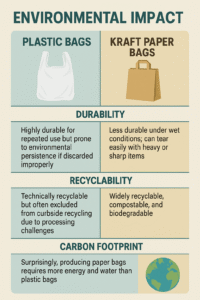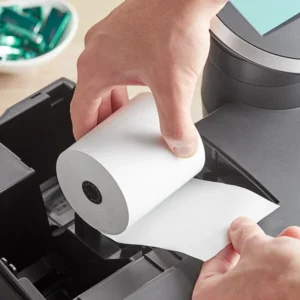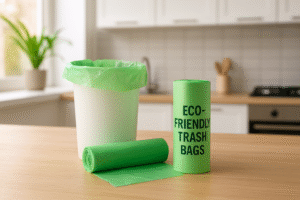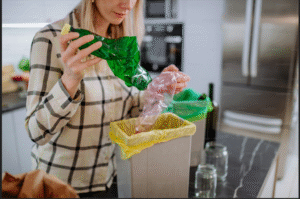FAQs Answered: Are They Recyclable or Biodegradable?
Trash bags are one of those everyday essentials we rarely think twice about—until we run into leaks, overflowing bins, or want to make eco-conscious choices.
Whether you’re decluttering your garage, composting in the kitchen, or aiming for a greener lifestyle, this guide has your back. We’re unpacking everything: from what trash bags are made of to the best sustainable alternatives.
🔗 Want to understand plastic waste better? See Trash Bags – Sustainable Management
🧪 Trash Bags: What Are They Made Of?
Most conventional trash bags are made of polyethylene plastic:
LDPE (Low-Density Polyethylene): Stretchy, tough, and good for kitchen use.
HDPE (High-Density Polyethylene): Thinner, lighter, and good for bathroom or office bins.
Eco-friendly options may use plant-based materials like cornstarch or PLA (polylactic acid), which claim to break down faster.
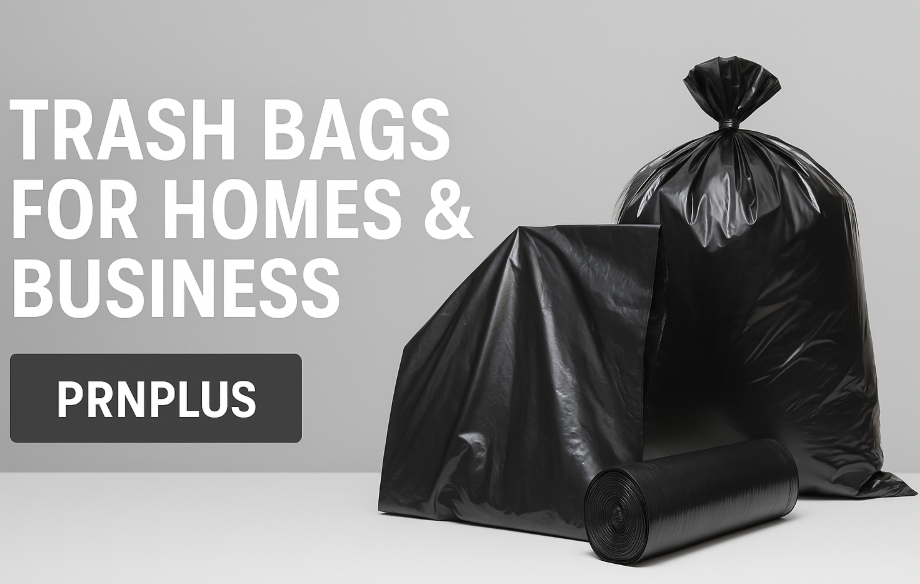
♻️ Are Trash Bags Recyclable?
Let’s break it down:
✅ Yes, if:
- The bags are clean and dry, they can be dropped off at plastic film recycling centers (often in grocery stores).
❌ No, if:
- The bags are used or dirty—they’re contaminated and should go to landfill.
♻️ Bonus Tip:
- Some areas offer plastic film recycling programs. Always check with your local municipality before tossing!
💡 Remember: Only clean film plastic goes in recycling. Everything else? Trash.
🌱 Are Trash Bags Biodegradable?
Most standard trash bags are not biodegradable—they can stick around for centuries.
🌿 Biodegradable Trash Bags:
These contain additives to help them break down, but only in the right conditions (oxygen, sunlight, heat). They may still leave behind microplastics.
✅ Compostable Trash Bags:
Made from renewable materials and designed to break down completely in industrial composting systems. Look for:
- BPI Certification
- ASTM D6400 standard compliance
🔗 Explore the differences in Green Citizen’s guide to compostable and biodegradable bags
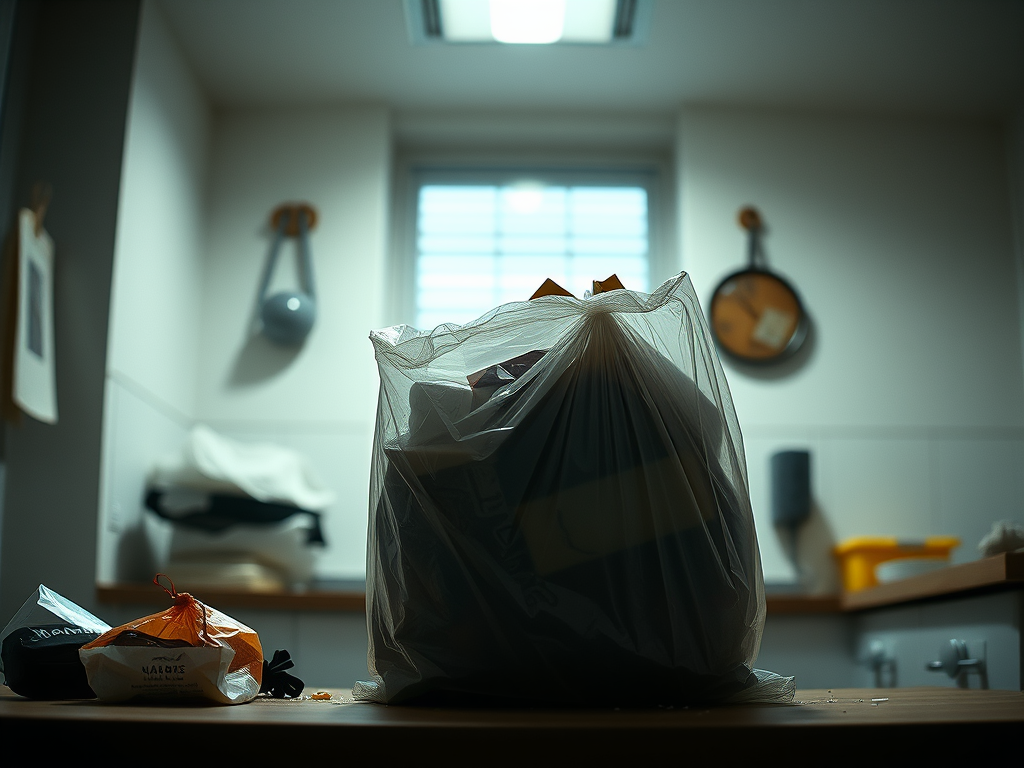
📝 Heads-Up: Compostable ≠ Biodegradable ≠ Recyclable. They all require different disposal methods.
🧺 What Are the Best Eco-Friendly Trash Bags Alternatives?
If you want to make better choices, start with these options:
- ✅ Certified Compostable Bags – best for food waste and compost bins.
- ✅ Reusable Cloth Liners – great for dry or light waste bins.
- ✅ No Bag At All – rinseable bins work well for yard or garden waste.
- ✅ Recycled-Content Plastic Bags – more sustainable than new plastic.
🚮 How Should I Dispose of Trash Bags?
Proper disposal keeps plastic out of oceans and wildlife safe.
| Bag Type | Where It Goes |
| Clean plastic bag | Plastic film drop-off location |
| Dirty/used plastic bag | Landfill |
| Compostable bag | Industrial composting facility |
| Biodegradable bag | Landfill or green bin (if allowed) |
| Reusable liner | Wash & reuse |
🔗 Check Earth911’s Recycling Search Tool to find the right facilities in your area.
🌍 How Do Trash Bags Affect the Environment?
Even small bags cause big problems:
- Long lifespans: Regular plastic bags may last hundreds of years in landfills.
- Microplastics: As they degrade, they release tiny particles into soil and water.
- Harm to wildlife: Animals can choke on or get entangled in bags.
💚 Pro Tip: Avoid double-bagging and use thinner bags for lightweight trash.
📦 Are There Special Trash Bags for Composting or Recycling?
Yes! Color-coding helps too:
- Blue or Clear Bags – often used for recyclables.
- Green or Brown Compost Bags – BPI-certified bags for food or yard waste.
🚨 Mixing up bag types in your bins can contaminate the whole load, so always double-check!
📏 What Sizes and Features Do Trash Bags Have?
Trash bags come in various:
- Sizes: 4–13 gallons (indoor) to 30–95 gallons (outdoor).
- Styles: Drawstring, scented, heavy-duty, biodegradable, etc.
💡 Buying Tip: Match the bag size to your bin and the type of waste to prevent rips or overflow.
🔁 Can You Reuse Trash Bags?
Before you grab a box off the shelf, consider:
- ✅ Material type: Plastic, recycled, compostable, or biodegradable?
- ✅ Certifications: Look for BPI or ASTM D6400 on compostable options.
- ✅ Strength & thickness: Get heavy-duty for big jobs, light bags for office bins.
✅ Size: Match your bin perfectly to avoid waste.
💭 Final Thoughts: Smarter Trash Habits Start Here
By simply choosing better trash bags and disposing of them responsibly, you’re helping reduce pollution, protect wildlife, and contribute to a cleaner world.
🔗 Want expert insights on trash sustainability? Read eco-friendly garbage bags.
✨ Quick Recap:
- Use compostable or recycled bags when possible.
- Avoid plastic whenever you can—especially for food waste.
- Reuse bags or skip them for dry waste bins.
- Follow your local recycling and composting guidelines.
It’s a small shift that makes a big difference. Let’s clean up our act—one bag at a time. 🌎💪
Ready to Make the Switch?
If this guide helped you rethink your trash bag choices, let us know! 💚
➡️ Still have questions about compostable or biodegradable options?
Share this post with a friend who’s going green!
Want more eco-tips like this?
👉 Subscribe to our blog or follow us on social media for practical guides to sustainable living.
Together, we can turn small habits into a cleaner planet. 🌍♻️


